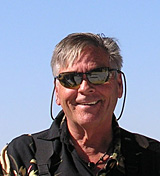 |
 |
 |
 Vallarta Living | Veteran Affairs | June 2006 Vallarta Living | Veteran Affairs | June 2006  
Outside Looking In
 David Lord - PVNN David Lord - PVNN


| | Grab your flags and welcome them home. Thank them for their service, and ask God to bless each one of them. |
We all have points of view and mine, like so many other veterans, is outside looking in. It has been that way since returning from Viet Nam in 1968. The months spent in recovery at the Naval Hospital in North Chicago happened to coincide with the Democratic National Convention and the anti-war riots of 1968.

My awareness, my knowing that fitting into America was not going to be easy for me began gradually, I was slow to accept it, never having experienced it before. I had come home from war with P.T.S.D. to a culture where being cool, long hair and political fervor over the war was in the hands of Hippies. I had returned to America, but did not come home to the place I known.

What I faced was discrimination for having been in the Military, I was so proud to be a Marine, I never imagined that I would be facing major discrimination as a Vietnam Vet. I knew that affirmative action for women and blacks in the 1970's was giving priority in hiring, and that blacks especially needed social preference in jobs to right the historical wrongs their ancestors endured in America. I thought that was the reason I couldn't get work.

My point of view from P.T.S.D. made me detached from America, my "outside-ness" became perpetual. I continue now, my perspective is literally from outside the USA, except for short trips, I always will be on the outside.

It really is easier for me to be here in Puerto Vallarta, where I can feel more connected to the people. They give me what I could not have in America, a community based on your contribution - not your past.

The latest studies from Canada, published from Toronto on May 23, show that Combat troops meeting the criteria for post-traumatic stress disorder (PTSD) who are still on active duty are much more likely to have physical health problems than their comrades, according to research presented here.

"Most earlier studies of PTSD have focused on veterans many years after they have returned from combat and found strong associations between the disorder and poor physical health," said Artin Terhakopian, M.D., of the Walter Reed Army Medical Center in Silver Spring, Maryland, at the American Psychiatric Association meeting here. "The new research is on active duty personnel 'working soldiers'," he added.

The researchers studied 2,863 soldiers of U.S. Army combat brigades that had been rotated back to the U.S. after duty in Iraq. Dr. Terhakopian and colleagues found dramatic differences between the 16% who were diagnosed as suffering from PTSD and those who were not.

Using an anonymous survey a year after the soldiers' return from combat duty in Iraq, Dr. Terhakopian and colleagues examined PTSD symptoms, self-rated health, sick call visits, and missed work days, as well as physical symptoms evaluated on a 15-point Patient Health Questionnaire (PHQ-15). The study found:

• 468 of the 2,815 soldiers who returned the surveys-or 16.6%-were rated as suffering from PTSD.

• Of those, 46.7% reported their health as fair or poor, compared with 19.8% of those without PTSD.

• 37.6% of those with PTSD had two or more recent sick call visits, compared with 20.5% of those without PTSD.

• 11.8% of those with PTSD reported recently missing two or more days of work because of illness, compared with 6.5%.

• Finally, 34.4% of those with PTSD had a PHQ-15 score indicating ill health, compared to 5.2% of their comrades.

Dr. Terhakopian noted that the study was cross-sectional, so that no conclusion can be drawn about whether PTSD causes ill health or vice versa. But he added that the clinical implication is that veterans with ill health without other obvious causes should be suspected of suffering form PTSD and offered treatment.

The veterans in Puerto Vallarta have care providers that respect your V.A. insurance if you are service-connected disabled and receiving compensation or pension benefits. I will be out of Vallarta on a trip for the next two or three weeks, but feel free to contact me by email.

 David Lord served in Vietnam as combat Marine for 1st Battalion 26th Marines, during which time he was severely wounded. He received the Purple Heart and the Presidential Unit Citation for his actions during the war in Vietnam. In Mexico, David now represents all veterans south of the U.S. border all the way to Panama, before the V.A. and the Board of Veterans Appeals. David Lord provides service to veterans at no fee. Veterans are welcome to drop in and discuss claims/benefits to which they are entitled by law at his office located at Bayside Properties, 160 Francisca Rodriguez, tel.: 223-4424, call him at home 299-5367, on his cell: 044 (322) 205-1323, or email him at mophmx@@yahoo.com or david.lord@yahoo.com. David Lord served in Vietnam as combat Marine for 1st Battalion 26th Marines, during which time he was severely wounded. He received the Purple Heart and the Presidential Unit Citation for his actions during the war in Vietnam. In Mexico, David now represents all veterans south of the U.S. border all the way to Panama, before the V.A. and the Board of Veterans Appeals. David Lord provides service to veterans at no fee. Veterans are welcome to drop in and discuss claims/benefits to which they are entitled by law at his office located at Bayside Properties, 160 Francisca Rodriguez, tel.: 223-4424, call him at home 299-5367, on his cell: 044 (322) 205-1323, or email him at mophmx@@yahoo.com or david.lord@yahoo.com.

Click HERE for more Veteran Affairs with David Lord »»» | 
 | |
 |



